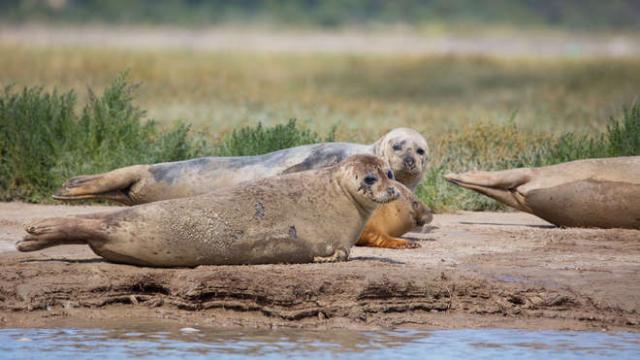Here is a bit of good news for those who love the Environment. The extent of pollution in the river thames in the 1950s was so severe that in 1957, the Natural History Museum declared it as “biologically dead.” However, there is a noticeable turnaround due to dedicated conservation efforts. The time has now come when scientists from the Zoological Society of London (ZSL) have seen more than 100 seal pups on the banks of the river. ZSL is an international conservation charity and they counted the 100+ pups on the sandbanks and creeks. It was the first time such a comprehensive exercise was undertaken.
Telegraph UK explains how the team operated. They used a light aircraft to capture images during the pupping season of harbor seals. ZSL conducted the research in 2018. It was a part of a UK-wide seal monitoring initiative. They have analyzed hundreds of photographs and have made public their conclusions. In their opinion, it was a resurrection of the River Thames. Its ecosystem has recovered from the brink of a write-off as a river that could not support life in its polluted waters with low oxygen levels.
60 years after the Natural History Museum declared the River Thames as “biologically dead”, more than 138 seal pups have been born in a single season according to figures released today.#waterpollution https://t.co/R5B2Ef0uVq
— NPS UK (@NPScorp_UK) September 2, 2019
The signs are positive
River Thames is home to both harbor seals and grey seals.
Out of them, only the former breed here and the 100+ seal pups are a positive indication that all is not lost. The population of harbor seals had gone down because of two bouts of local disease in 1988 and 2002. ZSL is maintaining a record of the numbers since 2013. Its latest status as of 2017 is 1,104 harbor seals and 2,406 grey seals across the estuary.
On the subject of relying on aerial photographs, ZSL explains that it was “much easier, and so more accurate, to count the seals in photos instead of the constantly moving, playful creatures”.
River Thames home to 138 baby seals, latest count finds https://t.co/abnHCIcJo5
— Guardian Environment (@guardianeco) September 2, 2019
Telegraph UK quotes a conservation biologist on the subject.
She clarifies that the availability of a reliable food source helped improve the count of seals and proves that the ecosystem of the Thames is thriving. This river is home to both varieties of seals but only the harbor seals breed here. However, marine life continues to remain under threat because of plastic-related injuries. The animal charity RSPCA mentioned about six grey seals that needed urgent care in Norfolk after they fell into the trap of plastic rubbish. Therefore, ZSL is spearheading a campaign to eliminate single-use plastics from London.
Message from River Thames
According to The Guardian, the river that was declared biologically dead in the 1950s has risen like the Phoenix. River Thames is now a nursery for not only 138 baby seals, but also a whole range of marine life like different species of fish that include salmon, a couple of species of shark, short-snouted seahorses and the European eel.
The last is on the list of critically endangered. Anna Cucknell of ZSL describes the river as an “essential nursery habitat” for harbor seal pups that have the ability to swim soon after they are born.
![Seals continue to thrive in the River Thames. [Image source/Tom Edwards, BBC London YouTube video] Seals continue to thrive in the River Thames. [Image source/Tom Edwards, BBC London YouTube video]](https://staticr1.blastingcdn.com/media/photogallery/2019/9/3/660x290/b_502x220x82/seals-continue-to-thrive-in-the-river-thames-image-sourcetom-edwards-bbc-london-youtube-video_2318499.jpg)



